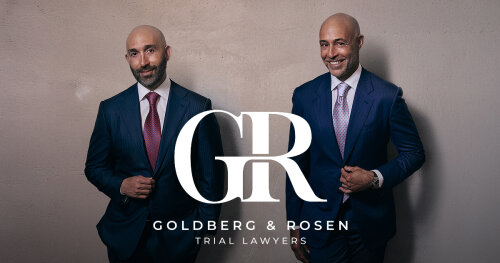Best Civil Litigation Lawyers in Florida
Share your needs with us, get contacted by law firms.
Free. Takes 2 min.
Or refine your search by selecting a city:
List of the best lawyers in Florida, United States
About Civil Litigation Law in Florida, United States
Civil litigation in Florida refers to the legal process that resolves non-criminal disputes between individuals, businesses, or organizations. Examples of civil cases include contract disagreements, property disputes, personal injury claims, landlord-tenant issues, and employment matters. Civil litigation typically begins when one party files a lawsuit against another in a Florida court, seeking resolution such as damages or specific actions. The process involves several stages, including pleadings, discovery, settlement negotiations, trial, and possibly appeals. Each step requires compliance with Florida's rules and procedures, which can be complex and time-consuming.
Why You May Need a Lawyer
There are multiple situations where seeking legal help in civil litigation becomes essential in Florida:
- You want to file a lawsuit against someone who has breached a contract or caused you harm.
- You have been sued and need to defend yourself in court.
- You are involved in a business dispute over services or payments.
- You are facing property disputes, such as disagreements over property lines or landlord-tenant issues.
- You are pursuing compensation for personal injuries, medical malpractice, or damage to your property.
- You seek enforcement or defense against a court judgment.
- You need mediation or arbitration support before or instead of going to trial.
- Your case involves complex legal procedures or significant financial stakes.
A qualified attorney can help you understand your rights, prepare legal documents, represent you in negotiations or court, and improve your chances of a favorable outcome.
Local Laws Overview
Civil litigation in Florida is governed by the Florida Rules of Civil Procedure, local court rules, and state statutes. Some key aspects include:
- Florida law establishes time limits, known as statutes of limitations, for filing different types of civil cases. For example, personal injury cases typically have a four-year limitation, while written contracts have a five-year limitation.
- Florida follows the comparative negligence rule in personal injury cases, which means that fault is divided among parties, potentially reducing the amount of compensation if you are partially at fault.
- In most civil cases, either party can request a jury trial, but some matters are decided solely by a judge.
- Florida courts encourage or require mediation in many cases before proceeding to trial to help parties reach a settlement.
- Small claims courts handle cases involving disputes of up to 8,000 dollars, offering a more streamlined and accessible process for minor civil claims.
- There are specific procedures for filing and responding to lawsuits, conducting pretrial discovery, and presenting evidence, which must be followed closely.
Frequently Asked Questions
What is civil litigation?
Civil litigation is the legal process of resolving disputes between parties over non-criminal matters in court, such as contracts, property, or personal injury claims.
How long do I have to file a lawsuit in Florida?
This depends on the type of claim. For example, you generally have four years to file for personal injury and five years for breach of a written contract. The exact deadline can vary, so consult a lawyer as soon as possible.
What types of cases are handled under civil litigation?
Common types include contract disputes, property claims, business disagreements, personal injury, defamation, landlord-tenant issues, and employment disputes.
Can I represent myself in a Florida civil court?
Yes, individuals have the right to represent themselves, known as "pro se" representation. However, civil procedures are complex, so legal representation is strongly recommended, especially in cases involving significant amounts of money or complicated legal issues.
What is the role of mediation in civil litigation?
Mediation is a process where a neutral third party helps disputing parties reach a settlement. Florida courts often require or encourage mediation before trial to promote resolution without a trial.
What happens if I lose my civil case?
If you lose, you may be required to pay damages or comply with the court's orders. You may also need to pay some of the other party's legal fees, depending on the circumstances and the court's decision. You might have the option to appeal.
How much does a civil litigation lawyer cost?
Costs vary widely depending on the lawyer’s experience, the complexity of the case, and the fee structure. Some lawyers charge hourly, while others may work on a contingency or flat fee basis. Always discuss costs upfront.
What should I bring to my initial meeting with a civil litigation attorney?
Bring all relevant documents, such as contracts, letters, emails, photographs, police reports, prior court filings, and any other materials related to your dispute.
Do civil cases go before a jury in Florida?
Some civil cases are heard by a judge (bench trial), while others may be heard by a jury if requested. The right to a jury trial depends on the nature of the case and parties’ preferences.
Can I recover attorney's fees and costs if I win?
In Florida, you can recover attorney’s fees and costs if a statute or contract specifically allows it or if the court finds it appropriate. Otherwise, each party generally pays their own legal fees.
Additional Resources
- Florida Courts - The Florida State Courts System provides information about court procedures, forms, and locations.
- The Florida Bar - Offers lawyer referral services and educational materials about civil litigation.
- Florida Legal Services - Provides assistance and resources for people with low incomes seeking legal help.
- Local county clerk of court offices - Can provide case filing information and resources specific to your area.
- Florida Small Claims Court resources - Useful for minor disputes and self-help guidance.
Next Steps
If you believe you are facing a civil litigation issue in Florida, review available documentation and note important deadlines. Consider scheduling a consultation with a qualified Florida civil litigation attorney to receive advice tailored to your situation. Many attorneys offer free or low-cost consultations for initial case evaluations. Consulting a lawyer early can help you understand your rights, options, and next steps, and it will improve your chances of resolving your matter efficiently and effectively.
If you have a low income or cannot afford an attorney, explore local legal aid organizations or seek help from the Florida Bar’s lawyer referral service. Remember, acting promptly and following proper procedures are crucial in protecting your legal rights in civil litigation matters.
Lawzana helps you find the best lawyers and law firms in Florida through a curated and pre-screened list of qualified legal professionals. Our platform offers rankings and detailed profiles of attorneys and law firms, allowing you to compare based on practice areas, including Civil Litigation, experience, and client feedback.
Each profile includes a description of the firm's areas of practice, client reviews, team members and partners, year of establishment, spoken languages, office locations, contact information, social media presence, and any published articles or resources. Most firms on our platform speak English and are experienced in both local and international legal matters.
Get a quote from top-rated law firms in Florida, United States — quickly, securely, and without unnecessary hassle.
Disclaimer:
The information provided on this page is for general informational purposes only and does not constitute legal advice. While we strive to ensure the accuracy and relevance of the content, legal information may change over time, and interpretations of the law can vary. You should always consult with a qualified legal professional for advice specific to your situation.
We disclaim all liability for actions taken or not taken based on the content of this page. If you believe any information is incorrect or outdated, please contact us, and we will review and update it where appropriate.
Browse civil litigation law firms by city in Florida
Refine your search by selecting a city.












